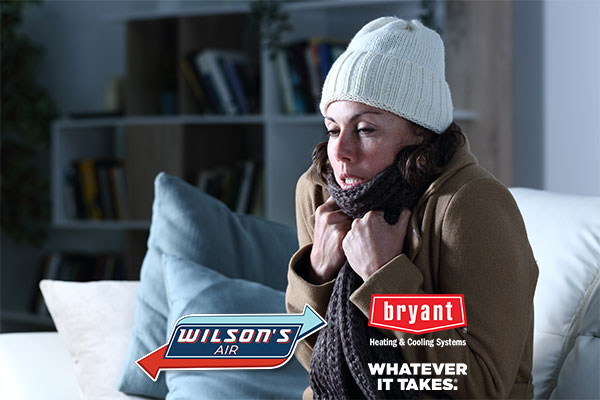Why Is My Heater Blowing Cold Air?

When winter’s chill sets in, the last thing anyone wants is for their heater to stop functioning as it should. If your HVAC system blows cold air instead of warm, you’ve come to the right place. This issue, often unexpected and always unwelcome, leaves homeowners puzzled and seeking immediate solutions. The dilemma of a heater blowing cold air is not an uncommon HVAC issue during the colder months. Understanding the reasons behind this problem can help to swiftly resolve the issue and restore the warmth in your home.
Common Causes of a Heater Blowing Cold Air
1. Clogged Air Filters
A clogged air filter is one of the most frequent culprits behind a heater blowing cold air. Air filters play a crucial role in maintaining the quality and flow of air through your heating system. These filters can restrict airflow when they accumulate dirt and debris over time. This restriction reduces the efficiency of your heater and can cause it to blow cold air. Regularly checking and replacing your air filters, especially during heavy usage in winter, is a simple, affordable, and effective way to prevent many HVAC issues, including when it blows cold air.
2. Faulty Thermostat Batteries
Another common reason for a furnace blowing cold air is a faulty thermostat, often due to old or faulty batteries. The thermostat is the command center of your heating system, regulating the temperature and ensuring comfort. If its batteries are weak or dead, the thermostat may lose its ability to accurately read and control the temperature, leading to inconsistent heating and, sometimes, cold air output. Regularly checking and replacing thermostat batteries is an easy fix to ensure your heater functions correctly.
3. Pilot Light or Ignition Problems
For gas heaters, issues with the pilot light or ignition system can lead to cold air in the house. If the pilot light goes out or there are issues with the ignition system, the furnace cannot produce heat. Regular inspections can identify these issues for quick repair before they lead to a cold and uncomfortable home.
4. Overheating
Furnaces and home heating systems have safety mechanisms that shut them off if they overheat. Overheating and the automatic switch to safety mode could cause your heater to blow cold air. Various factors can lead to overheating, including restricted airflow due to clogged filters or mechanical failures.
5. Ductwork Problems
Leaks or blockages in the ductwork can also lead to a furnace blowing cold air. Damaged or poorly sealed ducts can leak warm air before it reaches your living spaces, resulting in cold air flowing through your vents.
The Best Temperature for Your Heater in Winter
To maintain comfort and efficiency, setting your heater to the best temperature for winter is important. The U.S. Department of Energy suggests setting your thermostat to 68 degrees Fahrenheit when you’re awake and lowering it while you’re asleep or away from home. This balance ensures comfort while optimizing energy usage and cost. If you and your family are more comfortable in a warmer or cooler home, a programmable thermostat allows you to set the temperature to suit your preferences while maintaining energy efficiency. If the temperature drops below the thermostat setting, it’s likely due to a heating system issue.
Importance of Preventative Maintenance
Preventative maintenance is key to avoiding the unpleasant surprise of your heater blowing cold air in winter. Regular maintenance by an HVAC professional can identify and address issues like clogged air filters, battery replacements, pilot light problems, and ductwork inspections. This ensures your system operates at peak efficiency and extends its lifespan.
Preventative maintenance includes tasks like:
- Regular Filter Replacement: Changing your filters every three months, or more often in homes with pets or high dust levels, ensures clean and unrestricted airflow.
- Multi-Point Inspection: Having a professional perform a multi-point inspection on your heating system annually can catch small issues before they become major problems. This allows for immediate diagnosis and repair or recommendations for replacement.
- Thermostat Check-ups: Regularly checking your thermostat’s batteries and calibration ensures it accurately controls your heating system.
When you come inside on a blustery winter day, you don’t want to walk into a cold house. A heater blowing cold air in winter can turn a cozy home into an uncomfortable space. It’s crucial to understand the common causes, including clogged air filters, faulty thermostat batteries, pilot light issues, and the importance of setting the right temperature. Moreover, investing in a preventative maintenance plan can prevent these issues, ensuring your winter heater functions effectively when you need it most.
Remember, a well-maintained heating system is not just about comfort; it’s about safety, efficiency, and peace of mind. For preventative maintenance, HVAC inspection, and all your heating and cooling needs, contact the reliable and experienced team at Wilson’s Refrigeration and Air to schedule a service call and learn more about preventative maintenance plans for your home.
SCHEDULE ServiceThey came promptly, worked quickly, were very professional and their prices were very fair. I highly recommend them.
Paul Mims



